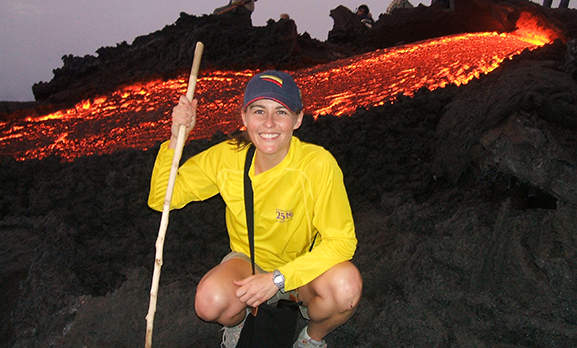
From the 2014 Celebrating Excellence | What do Colombia, Gabon and Brazil all have in common? For one thing, Lauren Wilder, a UA graduate with a bachelor’s degree in biology and classics, helped negotiate exploration rights for oil and gas in all three places.
Wilder’s first trip abroad as a land negotiator with Hess Corporation was to Lima, Peru. She traveled with two other Hess employees, “experienced professionals” she calls them, who had been to Peru dozens of times.
“I remember very distinctly being in the back of the car and looking around, and there wasn’t even anything to see,” she said. “I was trying to be cool, but at the same time, I couldn’t help being so excited to be somewhere new.”
At that time, Wilder had only left the United States once previously. Now, she’s done business in 11 different countries and finds joy in being challenged daily. And to think – she almost didn’t take the job because she didn’t want to work for an oil company.
Wilder found herself employed by Hess, where she’s been for the last seven years, because of an interview she reluctantly took to simply “gain experience with job interviews,” of which she had very little. She had graduated with her bachelor’s in 2001, double majoring in biology and classics, and she subsequently spent two years taking graduate-level secondary education classes at UA, when she decided to change direction and pursue an MBA, an attempt to broaden her horizons.
As an MBA student, Wilder was encouraged to sign up for interviews with companies looking for business students through the UA Career Center, and she jumped at nearly every opportunity, whether she was interested in the company or not.
“I actually didn’t sign up to interview with Hess because I didn’t want to work for an oil company,” Wilder said. “I got a call from the Career Center saying they had one extra spot.”
She took it, and though what followed was a halfhearted interview, the rest was history.
“I was completely not interested, but for whatever reason they liked me enough that they invited me to Houston to interview again,” she said. “Eventually they offered me a job. I spent a lot of time thinking about it, but eventually I took it. The job became more and more interesting to me as I learned more about the opportunities I would have to travel.”
In her first job as a land negotiator, she worked with governments in South America and West Africa to secure rights for oil and gas exploration. She also formed partnerships with other oil and gas companies to complete large-scale projects in foreign countries. Her biggest projects were in Gabon, Brazil and Peru.
Now, as a member of Hess’s commercial group, where she’s been since 2010, she is responsible for finding the most economic route for moving oil and gas from the drilling site to the market.
“I try to get the oil and gas as cheaply and as efficiently as I can to the market,” she said. “I decide how to transport the oil or gas, what the best route is to get the crude oil or gas to market, and what the best market is to sell the oil or gas in. It’s a lot of economics and supply and demand analysis. I’m more focused on negotiating contracts for transportation and contracts for constructing new pipelines.”
While she spent about 25 percent of her time traveling as a land negotiator, she now travels abroad only about twice each year. While she is based in Houston, she is currently managing projects in Kurdistan and the Gulf of Mexico.
Although most of her colleagues have degrees in engineering or business, Wilder said she’s used her undergraduate degrees more than she initially thought she might.
Wilder said her liberal arts background has given her a broad exposure to subject areas and the intellectual flexibility to adapt in a changing industry. “Part of the advantage I have is that my two undergraduate degrees are so different – a foreign language and a science,” she said.
“Every day I have to learn something a little bit different. Of course, having an arts and sciences background is extremely important on an everyday basis just because of the communication aspect, but at a very high level, having a background in the humanities just allows you to be quite nimble in the way that you learn things. I learned Spanish a few years ago, and it wasn’t as easy as I thought it would be, but because of my background in Latin, my Spanish will always be grammatically correct.”
Her affinity for languages isn’t the only thing that has helped her – so has her knowledge of chemistry.
“I thought I would never apply my biology degree to anything I did, but part of what I do now is look at the composition of different hydrocarbons, what an oil or gas molecule is composed of. Having had 16 hours of chemistry to go along with that biology degree is really, really helpful. I use organic chemistry quite often, and I can actually understand what that means.”
What she enjoys most about her job is the fact that every day brings something new.
“I am never bored, and I learn something new every week,” she said. “There are so many aspects of this industry to learn. You can be in the industry 20 years and still learn something new because strategies and technologies change.
“I had no idea what I was getting myself into when I started. Now, I’m in an industry I love, and I can’t imagine doing anything else.”